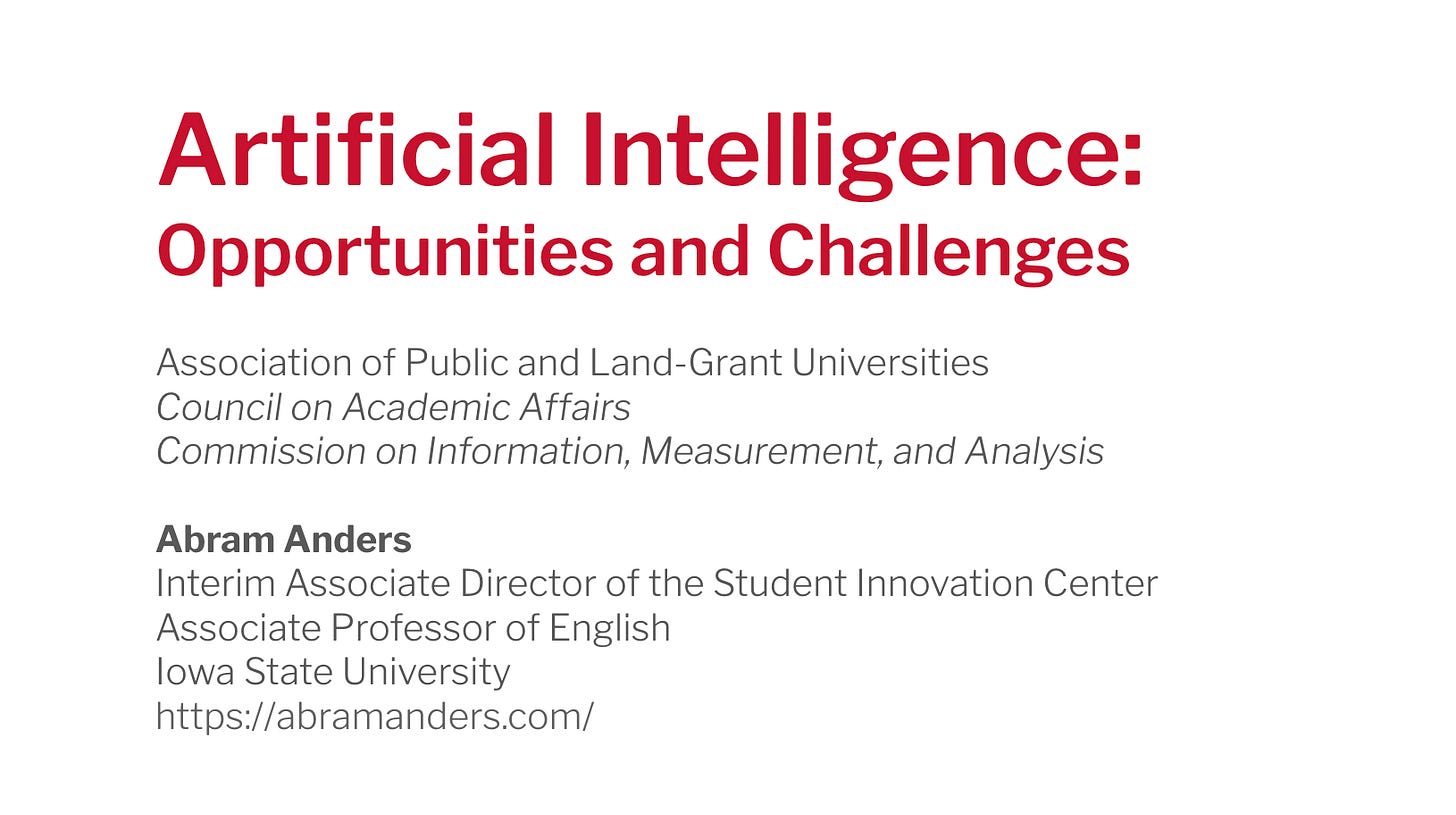Artificial Intelligence in Higher Ed: Opportunities and Challenges
Slideshow | Artificial Intelligence: Opportunities and Challenges
Here’s a very brief summary of the key ideas from my presentation for the Association of Public and Land-Grant University’s Council on Academic Affairs and Commission on Information, Measurement, and Analysis. The slideshow above provides a more detailed exploration of these ideas with research references.
Generative AI, which includes tools that can generate diverse applications including text, code, image, speech, video, and more, offers transformative potential for higher education. Despite posing challenges for educators due to its capacity to co-opt traditional forms of assessment, it also brings unprecedented opportunities for enhancing learning and professional outcomes.
As we anticipate the transformation of higher education by Artificial Intelligence (AI) tools, it's essential to take a deeper look at the ongoing experiments and pedagogical research. Understanding the role of AI and how it interacts with pedagogical strategies is vital for the future of teaching and learning.
AI Literacy in Higher Education
Students in the future will need not only an understanding of how to use AI tools, but also the ability to engage in self-regulated learning that integrates disciplinary knowledge. Working with AI can be seen as akin to training an intern - you need to not only understand the task but also be able to teach it. A higher order understanding is required to use these tools effectively.
At Iowa State, I am exploring the future of AI in education through a new experimental course in artificial intelligence and writing. In this effort, I’m seeking to guide students as we navigate the ethical challenges of AI use, develop prompts, compose texts that integrate AI-generated content, and apply AI literacy to a wide variety of disciplinary goals and personal interests.
AI and Pedagogical Innovation
The emerging literature on AI and pedagogy shows that transformative innovation requires shifting our understanding of the roles of students, instructors, and generative AI. Students will be responsible not only for their work but also for overseeing AI's output. Instructors will enable their students' evaluative judgment, and AI will become a valuable adaptive support for learning, particularly in social or active learning.
Challenges and Opportunities for Higher Education
There is an urgent need to develop situated AI literacies among students and help them adapt to the flexible policies for academic use that will be prevalent across disciplines and courses. Top-down policies on AI use and enforcement of academic integrity are neither feasible nor desirable. Instead, we should guide students to understand and responsibly use AI in their courses.
Another significant challenge is the need to change traditional assessment methods, which can be disrupted by generative AI. This challenge can be turned into an opportunity to focus on authentic learning experiences using active and experiential learning approaches.
Finally, academic leaders must shift their programs and curriculums to focus on student capacities for self-regulation, collaboration, and leadership. All disciplines will be transformed as higher-order skills such as critical thinking, communication, collaboration, creative problem-solving, and leadership become more crucial than ever as we all advance as humans in the loop with generative AI.
As we move forward in this AI-driven educational landscape, it is essential to ask ourselves: how might we proactively mitigate student confusion and academic integrity issues? And how can we promote pedagogical innovation that uses AI to enable better teaching and learning experiences? The answers to these questions will shape the future of higher education as we know it.


